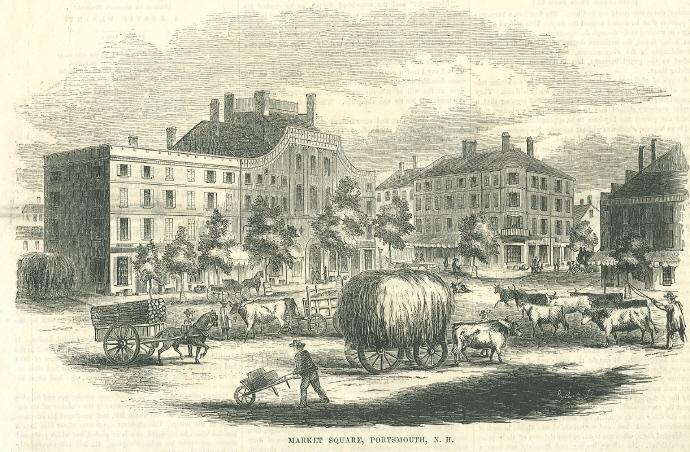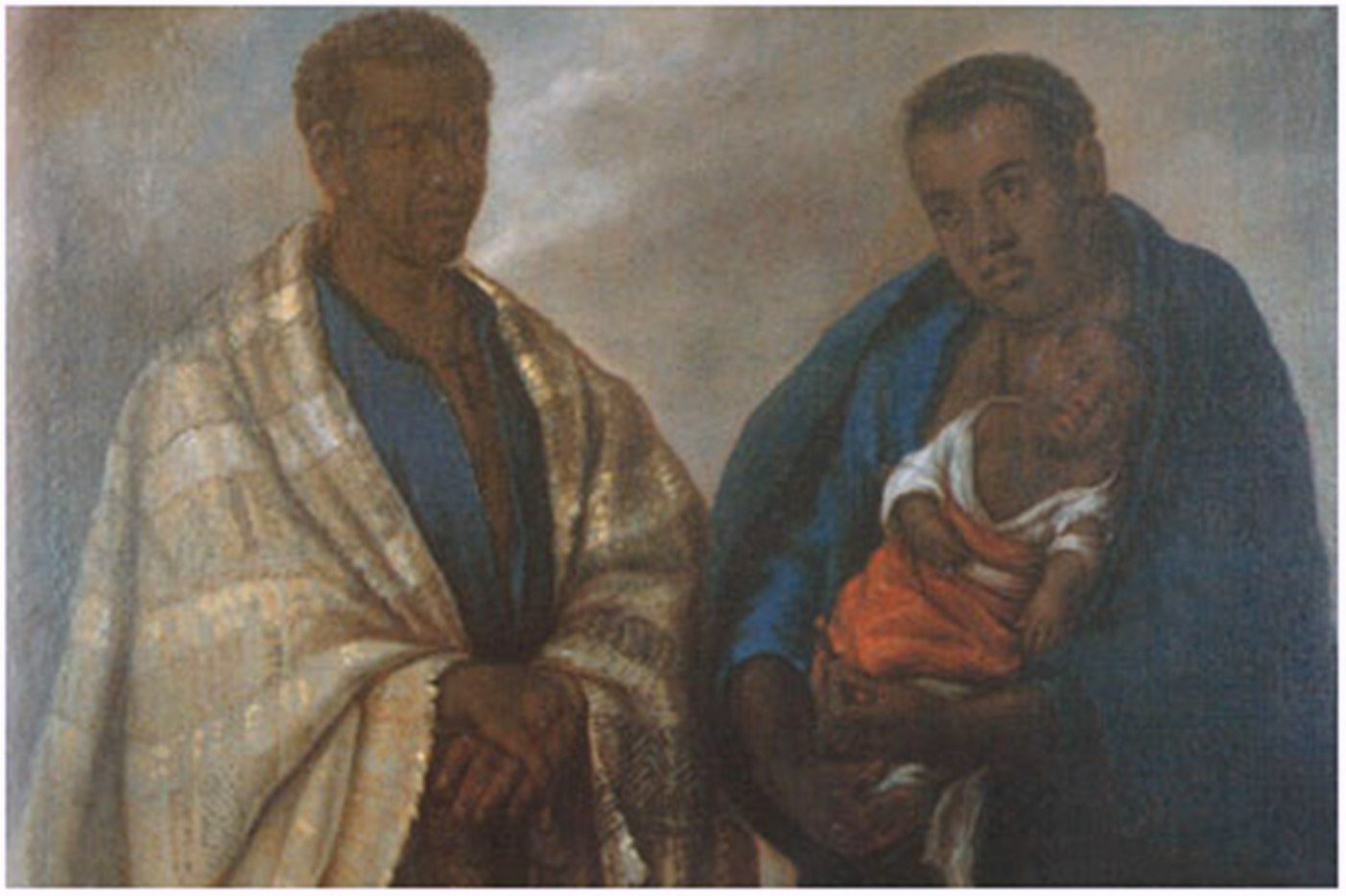|
Portsmouth African Burying Ground
The Portsmouth African Burying Ground is a memorial park on Chestnut Street in Portsmouth, New Hampshire, United States. The memorial park sits on top of an 18th century gravesite containing almost two hundred freed and enslaved African people. It is the only archeologically verified African burying ground for the time period in New England. The site was discovered in 2003 when construction workers discovered the buried while trying to dig a manhole. Remains of eight individuals were exhumed and determined to be of African diaspora, African descent. Of the eight remains, four were men, one was a female, one a child, and the rest were unable to be determined. History Although the exact date of the first burial in the African Burying Ground is unknown, maps dating back to 1705 have included the cemetery. The gravesite went out of use in the late 18th century but was mentioned in a newspaper written sometime in the mid-1800s. Maps of the city continued to include the cemetery un ... [...More Info...] [...Related Items...] OR: [Wikipedia] [Google] [Baidu] |
Cemeteries In New Hampshire
This list of cemeteries in New Hampshire includes currently operating, historical (closed for new interments), and defunct (graves abandoned or removed) cemeteries, columbaria, and mausolea which are historical and/or notable. It does not include pet cemeteries. Cheshire County * Cathedral of the Pines in Rindge * Second Rindge Meetinghouse, Horsesheds and Cemetery in Rindge; NRHP-listed Hillsborough County * Signer's House and Matthew Thornton Cemetery in Merrimack; NRHP-listed * St. Joseph Cemetery in Manchester * Valley Cemetery in Manchester; NRHP-listed Merrimack County * Blossom Hill and Calvary Cemeteries in Concord; NRHP-listed * Old North Cemetery in Concord; NRHP-listed Rockingham County * Chester Village Cemetery in Chester; NRHP-listed * Old North Cemetery in Portsmouth; NRHP-listed * Plains Cemetery in Kingston; NRHP-listed * Point of Graves Burial Ground in Portsmouth * Portsmouth African Burying Ground in Portsmouth Strafford County * Fores ... [...More Info...] [...Related Items...] OR: [Wikipedia] [Google] [Baidu] |
Portsmouth African Burying Ground Memorial Park 03
Portsmouth ( ) is a port and city status in the United Kingdom, city in the ceremonial county of Hampshire in southern England. The city of Portsmouth has been a Unitary authorities of England, unitary authority since 1 April 1997 and is administered by Portsmouth City Council. Portsmouth is the most densely populated city in the United Kingdom, with a population last recorded at 208,100. Portsmouth is located south-west of London and south-east of Southampton. Portsmouth is mostly located on Portsea Island; the only English city not on the mainland of Great Britain. Portsea Island has the third highest population in the British Isles after the islands of Great Britain and Ireland. Portsmouth also forms part of the regional South Hampshire, South Hampshire conurbation, which includes the city of Southampton and the boroughs of Eastleigh, Fareham, Gosport, Havant and Waterlooville. Portsmouth is one of the world's best known ports, its history can be traced to Roman Britain, ... [...More Info...] [...Related Items...] OR: [Wikipedia] [Google] [Baidu] |
Portsmouth, New Hampshire
Portsmouth is a city in Rockingham County, New Hampshire, United States. At the 2020 census it had a population of 21,956. A historic seaport and popular summer tourist destination on the Piscataqua River bordering the state of Maine, Portsmouth was formerly the home of the Strategic Air Command's Pease Air Force Base, since converted to Portsmouth International Airport at Pease. History American Indians of the Abenaki and other Algonquian languages-speaking nations, and their predecessors, inhabited the territory of coastal New Hampshire for thousands of years before European contact. The first known European to explore and write about the area was Martin Pring in 1603. The Piscataqua River is a tidal estuary with a swift current, but forms a good natural harbor. The west bank of the harbor was settled by European colonists in 1630 and named Strawbery Banke, after the many wild strawberries growing there. The village was protected by Fort William and Mary on what is now ... [...More Info...] [...Related Items...] OR: [Wikipedia] [Google] [Baidu] |
New England
New England is a region comprising six states in the Northeastern United States: Connecticut, Maine, Massachusetts, New Hampshire, Rhode Island, and Vermont. It is bordered by the state of New York to the west and by the Canadian provinces of New Brunswick to the northeast and Quebec to the north. The Atlantic Ocean is to the east and southeast, and Long Island Sound is to the southwest. Boston is New England's largest city, as well as the capital of Massachusetts. Greater Boston is the largest metropolitan area, with nearly a third of New England's population; this area includes Worcester, Massachusetts (the second-largest city in New England), Manchester, New Hampshire (the largest city in New Hampshire), and Providence, Rhode Island (the capital of and largest city in Rhode Island). In 1620, the Pilgrims, Puritan Separatists from England, established Plymouth Colony, the second successful English settlement in America, following the Jamestown Settlement in Virginia foun ... [...More Info...] [...Related Items...] OR: [Wikipedia] [Google] [Baidu] |
African Diaspora
The African diaspora is the worldwide collection of communities descended from native Africans or people from Africa, predominantly in the Americas. The term most commonly refers to the descendants of the West and Central Africans who were enslaved and shipped to the Americas via the Atlantic slave trade between the 16th and 19th centuries, with their largest populations in the United States, Brazil and Haiti. However, the term can also be used to refer to the descendants of North Africans who immigrated to other parts of the world. Some scholars identify "four circulatory phases" of this migration out of Africa. The phrase ''African diaspora'' gradually entered common usage at the turn of the 21st century. The term ''diaspora'' originates from the Greek (''diaspora'', literally "scattering") which gained popularity in English in reference to the Jewish diaspora before being more broadly applied to other populations. Less commonly, the term has been used in scholarship to r ... [...More Info...] [...Related Items...] OR: [Wikipedia] [Google] [Baidu] |
Kinte Cloth
Kente ( ak, kente or ''nwetoma''; ee, kete; Dagbani: Chinchini) refers to a Ghanaian textile, made of handwoven cloth, strips of silk and cotton. Historically the fabric was worn in a toga-like fashion by royalty among ethnic groups such as the Ashanti and Ewe. It is also worn by queens, princesses and women of Dagbon. In modern day Ghana, the wearing of kente cloth has become widespread to commemorate special occasions, with highly sought-after kente brands led by master weavers. Due to the popularity of kente cloth patterns, kente print, which is a mass-produced version, is popular throughout the West. Globally, the print is used in the design of academic stoles in graduation ceremonies. Etymology Kente comes from the word ''kenten'', which means "basket" in the Asante dialect of the Akan language, referencing its basket-like pattern. In Ghana, the Akan ethnic group also refers to kente as ''nwentoma'', meaning "woven cloth". Ashanti folklore includes a story where ... [...More Info...] [...Related Items...] OR: [Wikipedia] [Google] [Baidu] |
African-American Cemeteries
African Americans (also referred to as Black Americans and Afro-Americans) are an ethnic group consisting of Americans with partial or total ancestry from sub-Saharan Africa. The term "African American" generally denotes descendants of enslaved Africans who are from the United States. While some Black immigrants or their children may also come to identify as African-American, the majority of first generation immigrants do not, preferring to identify with their nation of origin. African Americans constitute the second largest racial group in the U.S. after White Americans, as well as the third largest ethnic group after Hispanic and Latino Americans. Most African Americans are descendants of enslaved people within the boundaries of the present United States. On average, African Americans are of West/Central African with some European descent; some also have Native American and other ancestry. According to U.S. Census Bureau data, African immigrants generally do not self-iden ... [...More Info...] [...Related Items...] OR: [Wikipedia] [Google] [Baidu] |
African-American Monuments And Memorials
African Americans (also referred to as Black Americans and Afro-Americans) are an ethnic group consisting of Americans with partial or total ancestry from sub-Saharan Africa. The term "African American" generally denotes descendants of enslaved Africans who are from the United States. While some Black immigrants or their children may also come to identify as African-American, the majority of first generation immigrants do not, preferring to identify with their nation of origin. African Americans constitute the second largest racial group in the U.S. after White Americans, as well as the third largest ethnic group after Hispanic and Latino Americans. Most African Americans are descendants of enslaved people within the boundaries of the present United States. On average, African Americans are of West/ Central African with some European descent; some also have Native American and other ancestry. According to U.S. Census Bureau data, African immigrants generally do not self- ... [...More Info...] [...Related Items...] OR: [Wikipedia] [Google] [Baidu] |

2009.jpg)





